外研版(2019)必修 第二册Unit 4 Stage and screen Using language (1) 课件(共27张PPT)
文档属性
| 名称 | 外研版(2019)必修 第二册Unit 4 Stage and screen Using language (1) 课件(共27张PPT) | 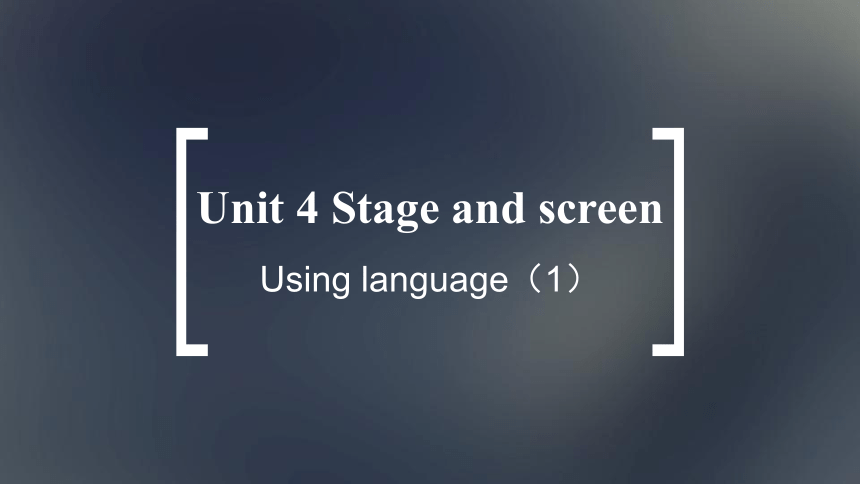 | |
| 格式 | pptx | ||
| 文件大小 | 1.5MB | ||
| 资源类型 | 教案 | ||
| 版本资源 | 外研版(2019) | ||
| 科目 | 英语 | ||
| 更新时间 | 2023-11-25 15:36:18 | ||
图片预览



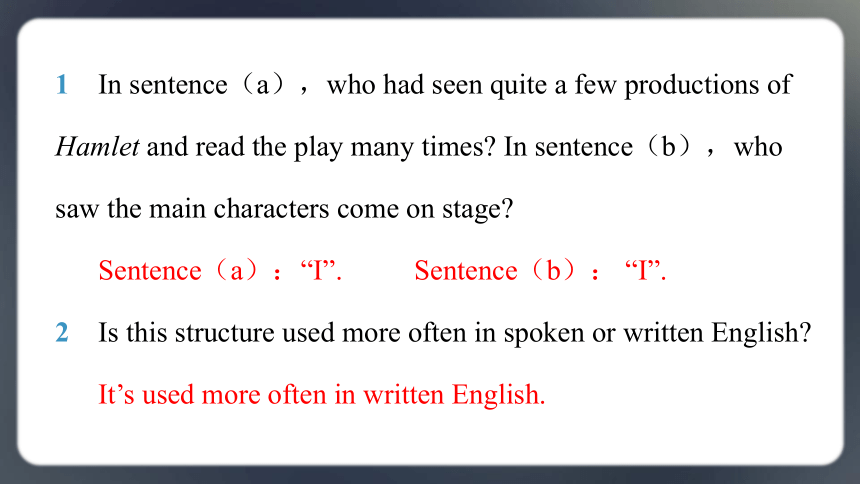

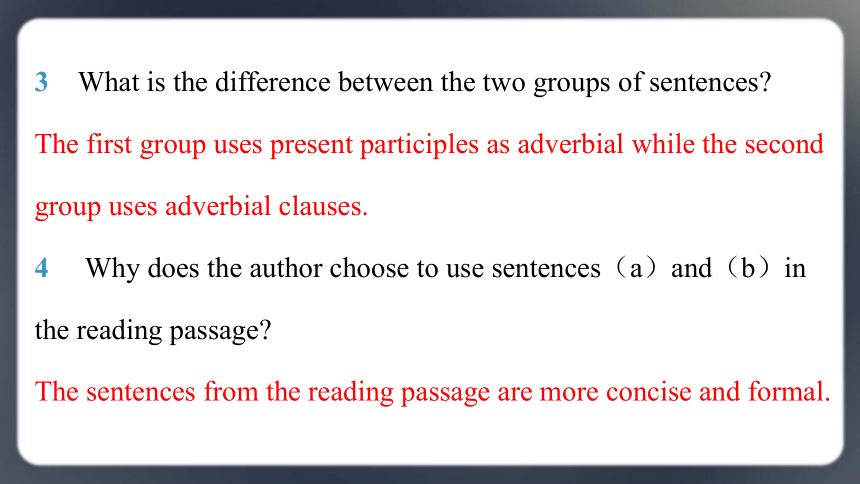
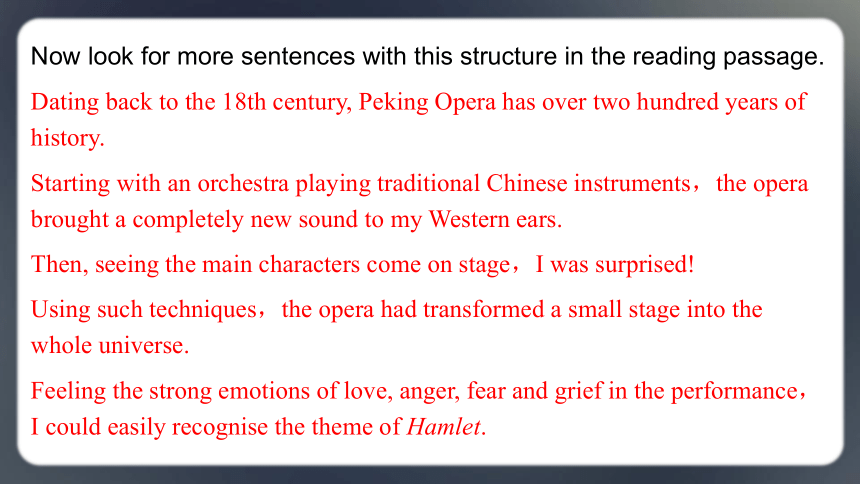

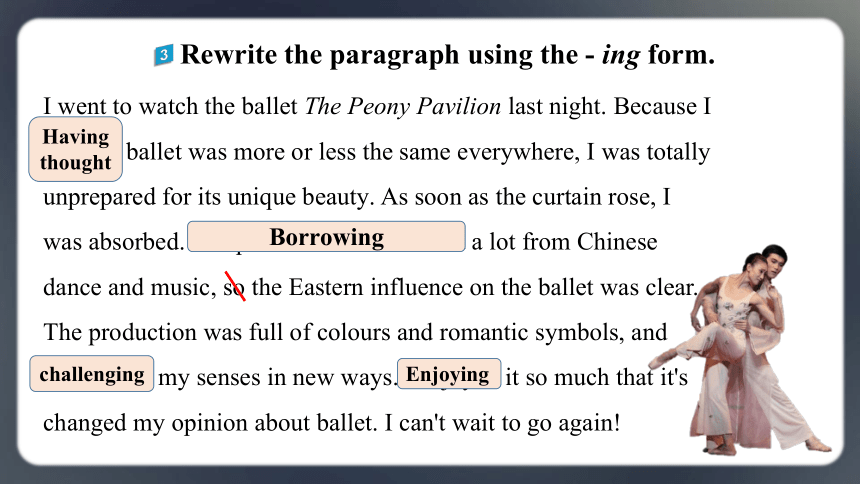
文档简介
(共27张PPT)
Unit 4 Stage and screen
Using language(1)
Using language
-ing as adverbial
Look at the sentences from the reading passage and answer the questions.
1
a Having seen quite a few productions of Hamlet and read the play many times, I was full of confidence - until the Peking Opera came to town!
b ... seeing the main characters come on stage, I was surprised!
1 In sentence(a),who had seen quite a few productions of Hamlet and read the play many times In sentence(b),who saw the main characters come on stage
Sentence(a):“I”. Sentence(b): “I”.
2 Is this structure used more often in spoken or written English
It’s used more often in written English.
c Since I had seen quite a few productions of Hamlet and read the play many times, I was full of confidence - until the Peking Opera came to town!
d ... when I saw the main characters come on stage, I was surprised!
Compare them with the following sentences and answer the questions.
3 What is the difference between the two groups of sentences
The first group uses present participles as adverbial while the second group uses adverbial clauses.
4 Why does the author choose to use sentences(a)and(b)in the reading passage
The sentences from the reading passage are more concise and formal.
Now look for more sentences with this structure in the reading passage.
Dating back to the 18th century, Peking Opera has over two hundred years of history.
Starting with an orchestra playing traditional Chinese instruments,the opera brought a completely new sound to my Western ears.
Then, seeing the main characters come on stage,I was surprised!
Using such techniques,the opera had transformed a small stage into the whole universe.
Feeling the strong emotions of love, anger, fear and grief in the performance,I could easily recognise the theme of Hamlet.
Complete the journal entry with the correct form of the verbs in brackets.
2
Seeing
felt
making
to practise/practising
Feeling
knowing
Rewrite the paragraph using the - ing form.
3
I went to watch the ballet The Peony Pavilion last night. Because I thought ballet was more or less the same everywhere, I was totally unprepared for its unique beauty. As soon as the curtain rose, I was absorbed. The performance borrowed a lot from Chinese dance and music, so the Eastern influence on the ballet was clear. The production was full of colours and romantic symbols, and challenged my senses in new ways. I enjoyed it so much that it's changed my opinion about ballet. I can't wait to go again!
Having thought
Borrowing
challenging
Enjoying
现在分词在句中可作时间、原因、条件、让步、结果、方式或伴随状语等,句子的主语就是它的逻辑主语,它表示的动作与句子主语是逻辑上的主动关系。
1 现在分词作状语时的形式
(1)现在分词的一般式与完成式
Turning around,she saw a car driving up.
她转过身,看见一辆小汽车开过来。
Having worked hard all day,I went to bed early.
辛苦工作了一整天后,我早早就上床睡觉了。
一般式(doing) 表示动作与谓语动词同事或几乎同时发生
完成式(having done) 表示动作发生在谓语动词之前
(2)现在分词的主动式与被动式
Being protected by the thick wall,they felt they were quite safe.
由于有厚墙保护,他们感到很安全。
Having been shown around the lab,we were led into a big hall.
参观完了实验室,我们被领进了大厅。
主动式 句子主语与现在分词表示的动作之间是主动关系
被动式 句子主语与现在分词表示的动作之间指被动关系
2 现在分词作状语的用法
(1)现在分词作时间状语,相当于时间状语从句,有时可在前面加上when 或while 表示强调。
Seeing the old photos(=when I saw the old photos),I remembered my childhood.
看到这些旧照片,我想起了我的童年。
When reading the newspaper,I heard the doorbell ring.
看报纸时,我听见门铃响了。
She picked up a few German phrases while staying in Berlin.
她在柏林逗留期间学会了几句德语。
(2)现在分词作原因状语,相当于原因状语从句。
Not knowing his address(=Because I don’t know his address), I can’t send this book to him.
因为不知道他的地址,所以我无法把这本书寄给他。
Being ill,he could not walk any farther.
因为生病,他再也走不动了。
(3)现在分词作条件状语,相当于条件状语从句。
Being more careful(=If you are more careful),you will make fewer mistakes. 如果再细心点儿,你就会少犯错误。
(4)现在分词作让步状语,相当于让步状语从句,有时现在分词(短语) 前可带有连词although,even if,even though 等。
Knowing all this(=Although they knew all this), they made me pay for the damage.
尽管知道了这一切,他们还是要我赔偿损失。
(5)现在分词作结果状语,表示必然的结果,通常放在句末。有时为了突出结果,现在分词前可加thus,相当于so 或so that 引导的结果状语从句。
Group activities were organized after class,building up children’s team spirit.
课后组织集体活动,培养了孩子们的团队精神。
【学法点拨】
不定式作结果状语时,常与only,never 连用,表示一种出乎意料的结果。
The actor intended to leave quickly,only to be surrounded by his fans.
这位演员本打算很快离开,结果却被他的影迷们包围了。
(6)现在分词作方式或伴随状语,说明谓语动词所表示的动作发生的方式、背景或情况。不能用状语从句替换,但常可转换成并列成分。
Using his skis,Nicholas built a snow cave.
尼古拉斯用他的滑雪板建了一个雪洞。
I stood by the door,not daring to say a word.
我站在门旁,不敢说一句话
(7)现在分词作评论性状语
有些现在分词(短语)用于句首,没有逻辑主语而独立存在,作为句子的独立成分来修饰全句,表明说话者的态度、观点等,这被称为评论性状语或评注性状语。常见的有:
generally speaking 一般说来 roughly speaking 大致说来
frankly speaking 坦率地说 judging from/by 由……判断
considering... 考虑到…… supposing... 如果……
providing... 如果…… assuming... 假设……
Roughly speaking,I’d say we need about $500.
粗略地说,我认为我们大约需要500 美元。
Frankly speaking,I think this whole situation is ridiculous.
坦率地说,我认为这整个局面很可笑。
Judging from the appearance, the watermelon is not mellow(成熟的) enough.
(1)When she saw those pictures, she remembered her first day at school.
= (see) those pictures, she remembered her first day at school.
(2)After we have made full preparations, we are ready for the examination.
= (make) full preparations, we are ready for the examination.
(3)If you go straight down the road, you will find the department store.
= (go) straight down the road, you will find the department store.
Seeing
Having made
Going
单句语法填空
(1)While (approach)the crossroads, you must be careful.
(2) (finish)his summary, he went out for a walk.
(3) (spend)nearly all his money, the employee couldn’t afford to stay at a hotel.
(4) (be)ill, he couldn’t book the flight.
approaching
Having finished
Having spent
Being
(5)Pressed from his parents, and (realize)that he has wasted too much time, the boy is determined to stop playing video games.
(6) (eat)at the cafeteria before, Tina didn’t want to eat there again.
(7) (turn) to the right,you will find a path.
(8) (try) many times,he still couldn’t overcome the difficulties.
realizing
Having eaten
Turning
Having tried
完成句子
(9) (一般说来),children are naturally curious.
(10) (从外表判断), it is very peaceful,but in fact,a war will break out soon.
(11) (考虑到预算), we have decided to give up the travel plan.
(12) (坦率地说),the resources in the world are very limited.
Generally speaking
Judging from/by the appearance
Considering the budget
Frankly speaking
3 现在分词构成的独立主格结构
现在分词作状语时,其逻辑主语与句子的主语应该一致,否则,现在分词应有自己的逻辑主语,构成独立主格结构。独立主格结构通常用来表示伴随的动作或情况,有时还可以表示时间、原因、条件或解释整个句子。
The situation getting worse,they had to ask for help.
情况越来越糟,他们不得不求助。
Time permitting,we shall go there on foot.
如果时间允许,我们将步行去那里。
We explored the big cave,Tony acting as our guide.
我们探索了那个大洞穴,托尼做我们的向导。
单句语法填空
(1)The meeting (be) over,we all went to the canteen. (2)There (be) no taxi,we walked to the corporation.
(3)Time (permit),we’ll wander around the mall.
being
being
permitting
完成课后相关练习
谢谢观看
谢谢观看
Unit 4 Stage and screen
Using language(1)
Using language
-ing as adverbial
Look at the sentences from the reading passage and answer the questions.
1
a Having seen quite a few productions of Hamlet and read the play many times, I was full of confidence - until the Peking Opera came to town!
b ... seeing the main characters come on stage, I was surprised!
1 In sentence(a),who had seen quite a few productions of Hamlet and read the play many times In sentence(b),who saw the main characters come on stage
Sentence(a):“I”. Sentence(b): “I”.
2 Is this structure used more often in spoken or written English
It’s used more often in written English.
c Since I had seen quite a few productions of Hamlet and read the play many times, I was full of confidence - until the Peking Opera came to town!
d ... when I saw the main characters come on stage, I was surprised!
Compare them with the following sentences and answer the questions.
3 What is the difference between the two groups of sentences
The first group uses present participles as adverbial while the second group uses adverbial clauses.
4 Why does the author choose to use sentences(a)and(b)in the reading passage
The sentences from the reading passage are more concise and formal.
Now look for more sentences with this structure in the reading passage.
Dating back to the 18th century, Peking Opera has over two hundred years of history.
Starting with an orchestra playing traditional Chinese instruments,the opera brought a completely new sound to my Western ears.
Then, seeing the main characters come on stage,I was surprised!
Using such techniques,the opera had transformed a small stage into the whole universe.
Feeling the strong emotions of love, anger, fear and grief in the performance,I could easily recognise the theme of Hamlet.
Complete the journal entry with the correct form of the verbs in brackets.
2
Seeing
felt
making
to practise/practising
Feeling
knowing
Rewrite the paragraph using the - ing form.
3
I went to watch the ballet The Peony Pavilion last night. Because I thought ballet was more or less the same everywhere, I was totally unprepared for its unique beauty. As soon as the curtain rose, I was absorbed. The performance borrowed a lot from Chinese dance and music, so the Eastern influence on the ballet was clear. The production was full of colours and romantic symbols, and challenged my senses in new ways. I enjoyed it so much that it's changed my opinion about ballet. I can't wait to go again!
Having thought
Borrowing
challenging
Enjoying
现在分词在句中可作时间、原因、条件、让步、结果、方式或伴随状语等,句子的主语就是它的逻辑主语,它表示的动作与句子主语是逻辑上的主动关系。
1 现在分词作状语时的形式
(1)现在分词的一般式与完成式
Turning around,she saw a car driving up.
她转过身,看见一辆小汽车开过来。
Having worked hard all day,I went to bed early.
辛苦工作了一整天后,我早早就上床睡觉了。
一般式(doing) 表示动作与谓语动词同事或几乎同时发生
完成式(having done) 表示动作发生在谓语动词之前
(2)现在分词的主动式与被动式
Being protected by the thick wall,they felt they were quite safe.
由于有厚墙保护,他们感到很安全。
Having been shown around the lab,we were led into a big hall.
参观完了实验室,我们被领进了大厅。
主动式 句子主语与现在分词表示的动作之间是主动关系
被动式 句子主语与现在分词表示的动作之间指被动关系
2 现在分词作状语的用法
(1)现在分词作时间状语,相当于时间状语从句,有时可在前面加上when 或while 表示强调。
Seeing the old photos(=when I saw the old photos),I remembered my childhood.
看到这些旧照片,我想起了我的童年。
When reading the newspaper,I heard the doorbell ring.
看报纸时,我听见门铃响了。
She picked up a few German phrases while staying in Berlin.
她在柏林逗留期间学会了几句德语。
(2)现在分词作原因状语,相当于原因状语从句。
Not knowing his address(=Because I don’t know his address), I can’t send this book to him.
因为不知道他的地址,所以我无法把这本书寄给他。
Being ill,he could not walk any farther.
因为生病,他再也走不动了。
(3)现在分词作条件状语,相当于条件状语从句。
Being more careful(=If you are more careful),you will make fewer mistakes. 如果再细心点儿,你就会少犯错误。
(4)现在分词作让步状语,相当于让步状语从句,有时现在分词(短语) 前可带有连词although,even if,even though 等。
Knowing all this(=Although they knew all this), they made me pay for the damage.
尽管知道了这一切,他们还是要我赔偿损失。
(5)现在分词作结果状语,表示必然的结果,通常放在句末。有时为了突出结果,现在分词前可加thus,相当于so 或so that 引导的结果状语从句。
Group activities were organized after class,building up children’s team spirit.
课后组织集体活动,培养了孩子们的团队精神。
【学法点拨】
不定式作结果状语时,常与only,never 连用,表示一种出乎意料的结果。
The actor intended to leave quickly,only to be surrounded by his fans.
这位演员本打算很快离开,结果却被他的影迷们包围了。
(6)现在分词作方式或伴随状语,说明谓语动词所表示的动作发生的方式、背景或情况。不能用状语从句替换,但常可转换成并列成分。
Using his skis,Nicholas built a snow cave.
尼古拉斯用他的滑雪板建了一个雪洞。
I stood by the door,not daring to say a word.
我站在门旁,不敢说一句话
(7)现在分词作评论性状语
有些现在分词(短语)用于句首,没有逻辑主语而独立存在,作为句子的独立成分来修饰全句,表明说话者的态度、观点等,这被称为评论性状语或评注性状语。常见的有:
generally speaking 一般说来 roughly speaking 大致说来
frankly speaking 坦率地说 judging from/by 由……判断
considering... 考虑到…… supposing... 如果……
providing... 如果…… assuming... 假设……
Roughly speaking,I’d say we need about $500.
粗略地说,我认为我们大约需要500 美元。
Frankly speaking,I think this whole situation is ridiculous.
坦率地说,我认为这整个局面很可笑。
Judging from the appearance, the watermelon is not mellow(成熟的) enough.
(1)When she saw those pictures, she remembered her first day at school.
= (see) those pictures, she remembered her first day at school.
(2)After we have made full preparations, we are ready for the examination.
= (make) full preparations, we are ready for the examination.
(3)If you go straight down the road, you will find the department store.
= (go) straight down the road, you will find the department store.
Seeing
Having made
Going
单句语法填空
(1)While (approach)the crossroads, you must be careful.
(2) (finish)his summary, he went out for a walk.
(3) (spend)nearly all his money, the employee couldn’t afford to stay at a hotel.
(4) (be)ill, he couldn’t book the flight.
approaching
Having finished
Having spent
Being
(5)Pressed from his parents, and (realize)that he has wasted too much time, the boy is determined to stop playing video games.
(6) (eat)at the cafeteria before, Tina didn’t want to eat there again.
(7) (turn) to the right,you will find a path.
(8) (try) many times,he still couldn’t overcome the difficulties.
realizing
Having eaten
Turning
Having tried
完成句子
(9) (一般说来),children are naturally curious.
(10) (从外表判断), it is very peaceful,but in fact,a war will break out soon.
(11) (考虑到预算), we have decided to give up the travel plan.
(12) (坦率地说),the resources in the world are very limited.
Generally speaking
Judging from/by the appearance
Considering the budget
Frankly speaking
3 现在分词构成的独立主格结构
现在分词作状语时,其逻辑主语与句子的主语应该一致,否则,现在分词应有自己的逻辑主语,构成独立主格结构。独立主格结构通常用来表示伴随的动作或情况,有时还可以表示时间、原因、条件或解释整个句子。
The situation getting worse,they had to ask for help.
情况越来越糟,他们不得不求助。
Time permitting,we shall go there on foot.
如果时间允许,我们将步行去那里。
We explored the big cave,Tony acting as our guide.
我们探索了那个大洞穴,托尼做我们的向导。
单句语法填空
(1)The meeting (be) over,we all went to the canteen. (2)There (be) no taxi,we walked to the corporation.
(3)Time (permit),we’ll wander around the mall.
being
being
permitting
完成课后相关练习
谢谢观看
谢谢观看
